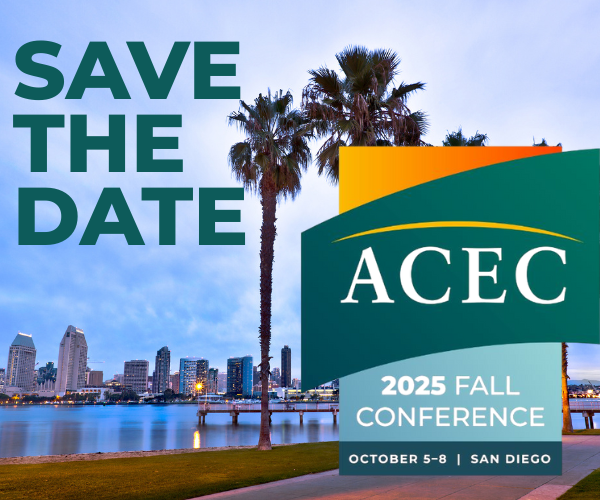ACEC News / Education
September 24, 2020
ACEC Research Institute Hosts Online Panel on Accelerating Infrastructure Project Delivery
The ACEC Research Institute, in partnership with Accelerator for America and the New Partnership on Infrastructure, hosted an online panel on Wednesday looking at recommendations to empower localities with effective project delivery tools and processes.
The panelists were Jamie Rubin, CEO of Meridiam NA; Manisha Patel, vice president at WSP USA; and Andy Winkler, associate director at the Bipartisan Policy Center.
Dayton Mayor Nan Whaley delivered a keynote address in which she said that federal infrastructure programs and solutions don’t always work at the local level. The challenge, she said, is translating “federal infrastructure projects so we can get the most leverage locally in our communities.
She highlighted three areas of concern: Uneven distribution of broadband access in communities across the country; ensuring that infrastructure jobs are local; and making sure that small and mid-sized cities have the same access to federal infrastructure funds as large cities.
In the panel discussion, the panelists discussed three of the 26 recommendations for improving infrastructure delivery in Community Serving Infrastructure: A Playbook for a New Infrastructure Partnership, which was recently published by the New Partnership for Infrastructure, the ACEC Research Institute, and several other organizations, including WSP USA and HNTB.
Rubin highlighted Recommendation 5: Procurement Efficiencies. He recounted the experiences of the Albuquerque, which in the response to the COVID-19 pandemic made several changes to its procurement rules to speed up delivery. “With careful planning, you can achieve the desired acceleration of stimulus while maintaining a commitment to broad-based competitiveness and inclusion,” he said.
In focusing on Recommendation 6: Accelerate Environmental Reviews, Patel said, “You do not have to sacrifice environmental protection and good community outcomes in order to expedite or speed up the delivery of projects. It is not a zero-sum game. One doesn’t have to come at the expense of the other.
Winkler addressed Recommendation 7: Federal Technical Support for Fast-Tracking P3s. “Even in states that authorize P3s, actual experience in negotiating and delivering a P3 is still fairly limited,” he said. “This creates an inertia among public agencies, leading them to use what are often the most familiar, conventional methods for procuring projects.” He said it is so important that state and local governments “have the support they from the federal government to access innovative financial tools.
Click here to listen to the hour-long panel discussion.
This session was the second of four panel discussions hosted by the ACEC Research Institute.
Click here to access the first panel discussion, which focused on Funding and Financing Infrastructure.
Additional panels will be held on:
September 30: Innovation in Climate and Water Infrastructure
October 7: Holistic Infrastructure Planning and Design
All comments to blog posts will be moderated by ACEC staff.







